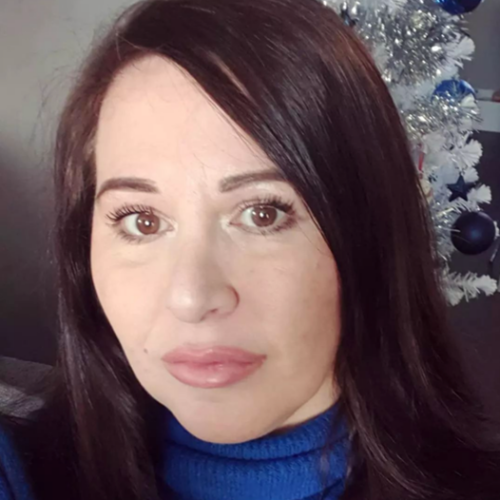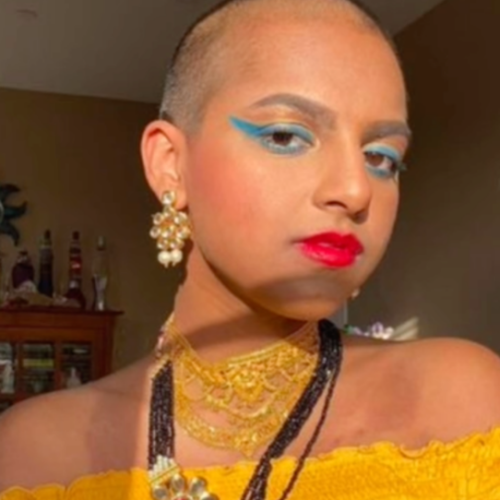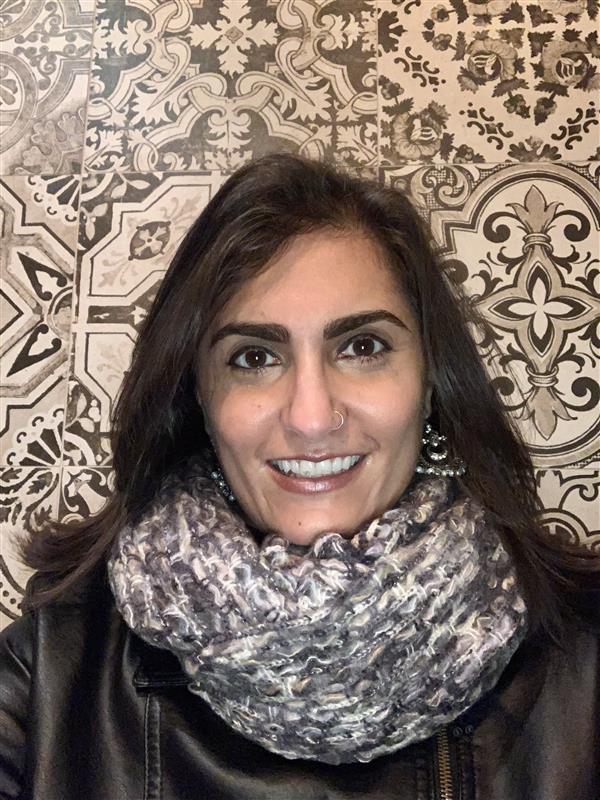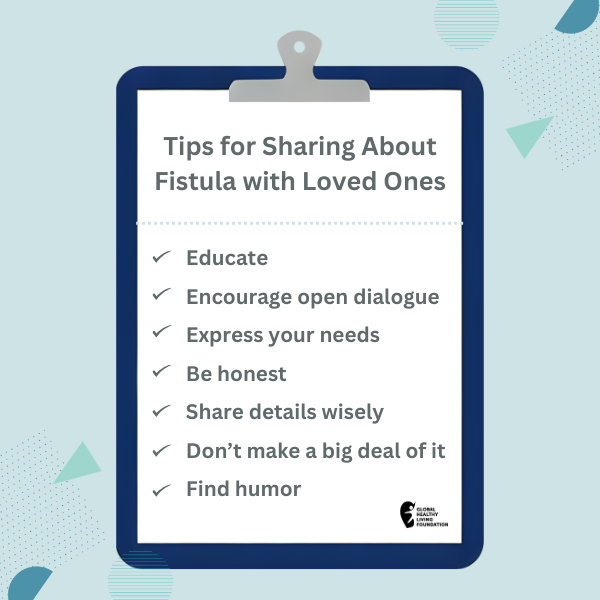We asked students with chronic illness what helped them in their journey.
Why LGBTQ+ Representation Matters to Me: Celebrating Diversity and Inclusion in Health Care
Why LGBTQ+ Representation Matters to Me: Celebrating Diversity and Inclusion in Health Care
In honor of LGBTQ+ Pride Month, hear firsthand from members of our chronic illness community about the vital importance of representation for the LGBTQ+ community in achieving health equity. Join us in the fight for inclusivity and equality.
June 12, 2023
GHLF STAFF

Lesbian, Gay, Bisexual, Transgender, and Queer (LGBTQ+) Pride Month is a special time in June to celebrate the rights and culture of LGBTQ+ people. It started in 1986 to honor the Stonewall riots, which happened when the police raided a gay bar called Stonewall Inn in New York City.
During this month, Queer individuals come together to support each other, and it’s a great time to show our support for the LGBTQ+ chronic illness community. Studies show that LGBTQ+ people have higher rates of chronic illness and more difficulty accessing health care compared to non-LGBTQ+ people.
“It’s crucial to have representation for LGBTQ+ individuals to address these health care disparities,” says Sarah Shaw, the Senior Manager of BIPOC Community Outreach at The Global Healthy Living Foundation. “LGBTQ+ patients should have the same access, attention, and treatment as heterosexual patients.”
To further highlight the unique health challenges and need for diversity and inclusion, we asked people living with chronic illnesses how representation in the community impacts their advocacy as LGBTQ+ individuals. “Diverse representation validates people who may have a slightly less traditional path to diagnosis or treatment,” says Eli B. (they/xe/he), who has ankylosing spondylitis and hypermobile Ehlers-Danlos syndrome. “It also helps doctors learn about the different ways diseases present in different groups.”
Grayson S. (he/him), who has systemic juvenile idiopathic arthritis and hypermobile Ehlers-Danlos syndrome, says, “Our liberation as communities is connected. When we find new LGBTQ+ folks who are chronically ill or disabled, it’s special. We can appreciate the rarity of it within our community.”
Take a moment to read these honest and enlightening responses and share them with others. Let’s bring attention to these important issues during LGBTQ+ Pride Month and beyond.
Eli B. (they/xe/he): “Never stop speaking out”
Eli, who resides in Texas, lives with ankylosing spondylitis and hypermobile Ehlers-Danlos syndrome.
Why Representation Matters to Me
“Representation matters in the chronic illness community because illness affects people of different marginalized groups differently. Hormone replacement therapy (HRT) can impact migraine and joint laxity as well as overall joint pain. Being LGBTQIA+ can affect access to vital health care, just like being BIPOC [Black, Indigenous, and People of Color] or AFAB [Assigned Female at Birth] can. Showing the nuances in people’s experiences validates people who may have a slightly less traditional path to diagnosis or treatment but also allows doctors to learn how diseases present in different groups. Marginalized voices are so important, so never stop speaking out. Happy pride.”
Follow Eli on Instagram @elibaum28

Yuri C. (they/them): “I’m othered by society all the time”
Yuri, who resides in California, lives with chronic migraine.
Why Representation Matters to Me
“I’m othered by society all the time, being Queer, mixed, and Disabled; it’s everything to see people like me. We need to improve social safety so people don’t have to constantly monitor how they look or speak to avoid being harmed. Especially in migraine groups where we’re looking for education and support. I’m already exhausted by chronic migraine. Being constantly vigilant is another level of exhaustion. We need a community that reflects us.”
Follow Yuri on Instagram @migrainetalk

Courtney W., MD (she/her): “Migraine does not discriminate”
Courtney, who works in Pennsylvania, lives with chronic migraine.
Why Representation Matters to Me
“I am a Black and Queer individual who has migraine. I’m also a physician who treats people with migraine and other headache disorders. It’s important to know that migraine does not discriminate. There is no ‘look’ of migraine. Anyone can experience it. And it’s important that those, especially from my communities, understand that migraine can affect us, and we deserve prompt diagnosis and appropriate, effective treatment that is individualized to our needs.”
Follow Courtney on Instagram, Twitter, TikTok, and YouTube @CSWhiteMD

Fred F. (they/she): “Invalidating my lived experiences”
Fred, who resides in Florida, lives with chronic migraine.
Why Representation Matters to Me
“Representation matters to me as a Brown, Queer person because I grew up not only noting an absence of people who looked like me in migraine ads but also had to live with the repercussions of medical professionals themselves invalidating my lived experiences with migraine disease. It’s also important for my fellow LGBTQIA+ community to see representation to address the stigma that Queer spaces may hold when it comes to disability.”
Follow Fred on Instagram and Twitter @IndecentAvocado

Kevin T. (he/him): “Helped me feel not as alone”
Kevin, who resides in Texas, lives with vestibular migraine and ankylosing spondylitis.
Why Representation Matters to Me
“Beyond rainbow flags during pride month, I believe the representation of LGBTQ+ individuals in the migraine community has helped me feel not as alone in migraine disease, especially being part of a culture that emphasizes youthfulness, beauty, and visible health.”
Follow Kevin on Twitter @onlylight210

Kelsey F. (they/them): “Care cannot be improved without education”
Kelsey, who resides in California, lives with chronic migraine, polycystic ovary syndrome, and fibromyalgia.
Why Representation Matters to Me
“Representation matters in the migraine community due to the disparities in access to care. Access to care cannot be improved without education, awareness, and advocacy for equitable health care.”
Follow Kelsey on Instagram @kelseysmigraine

CarmenRose F. (she/her): “Migraine and queerness are two things you can’t always see”
CarmenRose, who resides in New York, lives with chronic migraine.
Why Representation Matters to Me
“Representation matters because it makes people feel seen and less alone. Having migraine and being a Queer person can be two very isolating experiences. Migraine and queerness are two things you can’t always see — they’re relatively invisible, unless you wear a shirt that says, ‘I live with migraine’ or ‘I’m Queer’ all the time. It can feel like no one sees or understands what you’re going through. Seeing other folks like you is so validating. It’s literally lifesaving — and that’s not even a slight exaggeration.”
Follow CarmenRose on Instagram @carmenrosefiallo or Twitter @carmenrfiallo

Frankie L. (he/him): “We exist and deserve the same care”
Frankie, who resides in Nevada, lives with asthma, eczema, and hidradenitis suppurativa.
Why Representation Matters to Me
“As a trans person, getting medical care for my chronic illnesses almost always comes with an awkward conversation or having to out myself. Representation reminds people and the medical community that we exist and deserve the same care as anyone else. I spend so much time searching for LGBTQIA+ friendly medical providers — having more representation in the chronic illness community for Queer patients means that not only will I see people like me, but the medical community will see people like me and remember that we need care too.”
Follow Frankie on Instagram @Unclefrankstv
Sapphira L. (he/they): “Part of me wanted to shed away the past”
Sapphira, who resides in Michigan, lives with autism, ADHD, borderline personality disorder (BPD), complex post-traumatic stress disorder (C-PSTD), Ehlers-Danlos syndrome, and postural orthostatic tachycardia syndrome.
Why Representation Matters to Me
My chronic illnesses are a huge part of how I became LGBT+. For instance, I have C-PTSD due to multiple consistent abuses growing up. Luckily, I have since escaped that environment, but it is how I could come out as asexual and trans. Part of me wanted to shed away the past and become my new independent person. Combined with my agoraphobia and autism, I tend to be very closed up regarding my romantic and sexual attraction. It requires a deep proper connection for me to fall in love or even become acquainted with someone, and a huge part of that is them becoming familiar with my chronic illness and LGBTQ+ identity. Once they’ve become familiar with both, they will find my loyalty and love plentiful, which I think is both my ADHD and my BPD kicking in where there is just so much of myself to give once people have crossed those checkpoints correctly.
Follow Sapphira on Twitter @Ssapphiraa

Grayson S. (he/him): “I ran into a lot of bigotry in chronic illness spaces”
Grayson, who resides in Ohio, lives with systemic juvenile idiopathic arthritis and hypermobile Ehlers-Danlos syndrome.
Why Representation Matters to Me
“When I first came out as trans, I ran into a lot of bigotry in chronic illness spaces. People didn’t understand and weren’t sure how to learn. As time passed, people learned more and felt more comfortable talking about these issues, but it was rough for a minute. When I connect with new chronically ill, and disabled LGBTQ+ folks, it feels like finding my chosen family in a way that I don’t know I’ve ever experienced before. It’s unspoken, and yet we can bask in the knowledge of finding something that feels rare for our community. I love that.”
Follow Grayson on Twitter @GraysonGoal

Chiền Binh (she/her): “Empowering through the hard days”
Chiền Binh, who resides in Wisconsin, lives with persistent postural-perceptual dizziness and intractable migraine without aura.
Why Representation Matters to Me
“Representation matters for many reasons. For starters, migraine attacks are invisible illnesses, and I think that women of color have an even higher expectation to ‘suck it up’ or are not believed; and I cannot even fathom what it is like for Black individuals or Indigenous individuals. Speaking as an Asian woman, the stereotype that I must be ‘submissive’ often leads me to think that I must be quiet about what I struggle with; otherwise, I will be perceived as making it up, whining, or incapable of handling life, work, etc. Representation is needed, and it matters because the global majority struggles with chronic illnesses that can and cannot be seen. I feel we have to work even harder to fight ableism, racism, homophobia, and more, and it is tiring. Having a community of color can be empowering through the hard days.
Follow Chiền on Twitter @CBNS77 or TikTok @littlewarrior77

Jae W. (they/them/him): “Gives us hope that we can do it too”
Jae lives with rheumatoid arthritis, Sjögrens, fibromylagia, and Raynaud’s syndrome.
Why Representation Matters to Me
“Representation is essential for Queer folks as part of the chronic illness community because we already struggle to be treated equally in society as a whole. The Queer community has the highest rates of suicide in the United States. So, when we open ourselves up to health care providers and require care, the negative responses compound the struggle with rejection and isolation. We have certain issues that are the same as most of the chronic illness community, but so many issues unique to us that require courage and hope to navigate. Seeing someone like us navigating advocacy and/or personal care successfully will encourage us, giving us hope that we can do it too.”

Stacy F. (she/her): “Learn how to be there for each other”
Stacy, who resides in Pennsylvania, lives with anxiety, ADHD, migraine, C-PTSD, and depression.
Why Representation Matters to Me
“LGBTQIA+ representation within the chronic illness community is essential because we can learn how to be there for each other more. Each community is good at supporting others but in different ways. We need to come together to increase our understanding of community care.”
Follow Stacy on Instagram @stack.finn

Karen P. (she/her): “Representation is essential”
Karen, who resides in Scotland, lives with fibromyalgia and vestibular migraine.
Why Representation Matters to Me
“As a bisexual person with multiple chronic illnesses/disabilities, I feel representation is essential. Studies show members of the LGBTQ+ community are more likely to have a disability. As marginalized communities, we need to be inclusive and respectful of all sexualities. We face enough exclusion and abuse from others.”
Follow Karen on Instagram @chronic.kp

Iman R. (she/they): “A lot of chronic illnesses are gendered”
Iman, who resides in California, lives with chronic migraine, POTS, and EDS.
Why Representation Matters to Me
A lot of chronic illnesses are gendered. The statistics are gendered. People are misgendered in medical spaces – In terms of medications, treatments, and how medical professionals speak to you. How you are addressed. The sexist issues with time, pain tolerance, and being believed. Being addressed as a cisgender person in a heterosexual relationship. Assuming lifestyle choices and preferences with treatments regarding who’s with you and who they are. Not being taken seriously if you are in a relationship with the same sex. Disregarding birth control for same-sex relationships, even if birth control or other treatments can be used for other medical reasons. Discrimination if part of another group that you are in outside of the medical field, and they judge you based on what they find out in the room. Religion, culture, race, ethnicity, migration, etc.
Follow Iman on Instagram @alilbitofaith

Jamila R. (she/her): “A matter of life and death”
Jamila, who resides in Florida, lives with anxiety, chronic migraine, Celiac disease, depression, and long COVID.
Why Representation Matters to Me
“As a Queer, Disabled, Black Latinx woman, representation is essential. It can, and often is, a matter of life and death, especially for Black women. My pain and symptoms are often dismissed, not believed, misdiagnosed as a simpler disease, or blamed on things like stress and anxiety. This makes getting treatment so much more challenging and takes longer and forces me to go to multiple specialists until I find one with some empathy that believes me. Being in pain every day is already hard enough, to say the least, but dealing with the racism, sexism, and homophobia in the health care system, especially in America, makes things even worse.”
Follow Jamila on Instagram or Twitter @JamilaRowser
Nicole M. (she/her): “Representation is vital so physicians can accurately treat us”
Why Representation Matters to Me
“A physician once told me he discounted my pain scale because “Blacks feel less pain.” Representation is vital so physicians can accurately and comprehensively treat us and so that Queer and Trans people of color see seeking care as possible and worthwhile.”
Follow Nicole on Instagram @blackfemmemagic

Grace E. (she/they): “Pride requires radical diversity, which includes Disabled Queer people’”
Grace, who resides in Hawaii, lives with chronic migraine, complex regional pain syndrome, fibromyalgia.
Why Representation Matters to Me
“Representation as a Queer and Disabled person is crucial because so many disabilities and conditions disproportionately affect Queer people. For example, LGTBQ+ people are 58 percent more likely to experience migraine disease and have a significantly higher prevalence of chronic pain than non-LGBTQ+ people. There cannot be truly representative disability and health spaces without Queer people, and advocating for disabled and chronically ill people requires advocating for the Queer community. Further, pride requires radical diversity, which includes disabled Queer people. Queer spaces and communities are neither if they are not accessible and inclusive.”
SUBSCRIBE TO GHLF
RELATED POST AND PAGES
_
Was this article helpful?
YesNo







